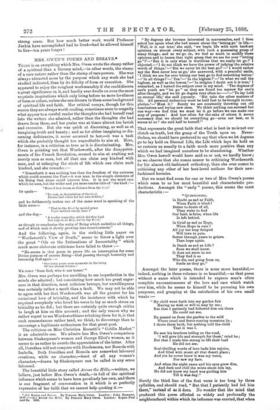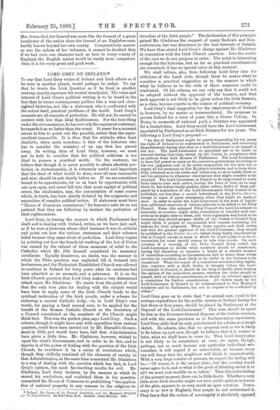MRS. OWEN'S POEMS AND ESSAYS.* THERE is on everything which
Mrs. Owen wrote the stamp rather of a spiritual than a literary mind,—in other words, the stamp of a rare nature rather than the stamp of rare powers. She was always attracted more by the purpose which any work she had studied indicated, than by its felicity of form or execution. She appeared to enjoy the roughest workmanship if she coulddiscern a great significance in it, and hardly ever dwells on even the most exquisite inspirations which only bring before us mere loveliness of form or colour, unless she can discern in them some background of spiritual life and faith. Her critical essays, though for this reason they are always worth reading, sometimes seem to magnify what appear to a careful reader the thoughts she had herself read into the writers she admired, rather than the thoughts she had drawn from them, and her praise was at times almost too lavish and excessive. But she was quick at discerning, as well as at imagining truth and beauty ; and as for either imagining or dis- cerning deficiencies, it never occurred to her,—it was a task which she probably thought too unprofitable to aim at. Here, for instance, is a criticism as true as it is discriminating. Mrs.
Owen is pointing out that Wordsworth, after the disappoint- ments of the French Revolution, seemed to aim at exalting not merely man as man, but all that can claim any kindred with man, and at enlarging the circle of life which can claim such kindred, and she remarks :—
"Henceforth it was nothing less than the freedom of the universe which could content the Poet—it was man in the simple elements of his Being that alone could interest him. It is not the word race which he uses, but the wider and yet more tender title of the kind 'Housed in a dream at distance from the kind.'
Or again-
' That to the Kind by special grace Their instinct surely came ?'
'A tender symplthy, which did thee bind Hot only to us Men, but to thy Kind,'
as though to emphasise the unity of Being which underlies all things, and of which man is slowly growing into consciousness."
And the following, again, in the striking little paper on " Wordsworth's View of Death," seems to throw a light over the great "Ode on the Intimations of Immortality" which much more elaborate criticisms have failed to throw :—
" He seems in that poem to prove life an interruption for some Divine purpose of unseen Being—God passing through humanity and becoming God again :— ' Our noisy years seem moments in the being Of the eternal Silence
We come from God, who is our home.'"
Mrs. Owen was perhaps too unwilling to see imperfection in the minds she admired ; but considering how much too great eager- ness in that direction, most criticism betrays, her unwillingness was certainly rather a merit than a fault. We may not be able to agree with her that Wordsworth was all the greater for his occasional love of triviality, and the insistance with which he required everybody who loved his verse to lay as much stress on triviality as he did ; but there are certainly quite enough critics to laugh at him on this account ; and the only reason why we rather regret to see Wordsworthians rebuking them for it, is that such remonstances rather tend, we think, to discourage than to encourage a legitimate enthusiasm for that great poet.
The criticism on Miss Christina Rossetti's "Goblin Market" is an admirable one. We admire less Mrs. Owen's comparison between Shakespeare's women and George Eliot's women, as it seems to us rather to overdo the appreciation of the latter. After all, Dorothea will not compare with Desdemona, nor Romola with Isabella. Both Dorothea and Romola are somewhat laboured creations, while no character,—least of all any woman's character,—drawn by Shakespeare can be called in any sense ]aboured.
The beautiful little story called Across the Hille,—written, we believe, just before Mrs. Owen's death,—is full of the spiritual influence which seems to have been peculiarly her own, and there is one fragment of conversation in it which is so perfectly expressive of her faith that we cannot help quoting it :-
•
(I.) Essays and Poems. By Frances Mary Owen. London : John Rumpus. 1857.—(2.) Across the Rills. By Frances Mary Owen. London: Kogan Paul and 0o. 18BS. ' To seek, in degradation of the kind, Excuse and solace for her own defects ;' and he deliberately makes uss of the same word in speaking of the little wren—
and the dog-
"By degrees she became interested in conversation, and I then asked her again what she had meant about the 'letting go' in life.— ' Well, is it not true,' she said, we begin life with such hard-set opinions on almost every subject, with such a possessing grasp of many things ; and as we go on, we find so much to modify those opinions and to loosen that tight grasp that we are for ever "letting go "P'—' Bat it is only what is worthless that we really let go ?' I objected.—' I do not think we have the power of judging the relative worth of things.'—' But we never let the best go ?'—' I would rather say the Best never lets us go,' she answered, with a peaceful smile. I think we are for ever letting our beat go to find something better.' —` In all things ?'—' Yes.'—' In the highest ?'—' In what we call the highest, as well as the lowest.'—' In religion I doubt not it is tree,' I remarked, as I turned the subject over in my mind. The dogmas of one's youth are "let go" as they are found too narrow for one's
after-thought, and we let go dogma very often To lay hold on eternal life,' she said joyously. Bat take the other matters of life. All personal endeavour must be held fast to be brought to com- pletion.'—' Must it ? Surely we are constantly throwing out old conclusions and trying new ones. We think nothing can succeed but one way—we find that we must let it go before we can make one step of progress ! And how often for the sake of others it seems necessary that we should let everything go—even our beet, as it seems to us !' she said half to herself."
That represents the great faith that what is beat in us is not our clutch on truth, but the grasp of the Truth upon us. Never- theless, we should have preferred to say that when we let dogmas go to lay hold on Eternal Life, the Life which lays its hold on us restores us usually to a faith much more positive than any which we had imagined ourselves to be abandoning. Whether Mrs. Owen herself would have said so or not, we hardly know; as we observe that she comes nearer to criticising Wordsworth for his almost old-fashioned orthodoxy, than she ever comes to criticising any other of her best-loved authors for their new- fashioned heresies.
Bat we must find room for one or two of Mrs. Owen's poems which seem to no her most beautiful and characteristic pro- ductions. Amongst the " early " poems, this seems the most characteristic :—
"QUESTIONING.
Is Doubt as sad as Faith, When Faith is blind ? Better to doubt of all, Than wake to find Our faith is false, when life Is left behind.
Is Grief as sad as Hope, When Hope is vain ? All joy too long delayed Will turn to pain.
Better through years to grieve Than hope again.
Is Death as sad as Life ?
Soon we shall know. It does not seem to me They find it so Who die, and going from us, Smile as they go."
Amongst the later poems, there is none more beautiful,— indeed, nothing in these volumes is so beautiful,—as that poem without a name which is intended to express man's often complete unconsciousness of the love and care which watch over him, while he seems to himself to be pursuing his own purposes, and, grasping at the satisfaction of his own small wants :—
"My child went forth into my garden fair Having no wish or will to stay by me ;
But that I patiently had followed him out there He weld not see.
He passed on from the garden to the wild Where creel and fierce-roaring monsters lie ; I drove them back, but nothing told the child That it was I.
He saw his brothers toiling on the road, will give life and strength for them,' cried he ; But that I made him strong to lift their load He did not see.
Soul-thrilling words of love bade him rejoice, And filled with EIGElie all that desert place; And yet he never knew it was my voice, Nor saw my face.
And when the night came and his eyes grew dim, And dark and chill the mists about him lay, Be did not know my hand was guiding him Till it was day."
Surely the third line of the first verse is too long by three syllables, and should read, "But that I patiently had led him
there," instead of as it does. No wonder that the mind that
produced this poem affected so widely and. profoundly the neighbourhood within which its influence was exerted, that when Mrs. Owen died, her funeral was more like the funeral of a great benefactor of the nation than the funeral of an Englishwoman hardly known beyond her own county. Comparatively narrow as was the sphere of her influence, it cannot be doubted that if we had even one character such as hers in every county of England, the English nation would be vastly more competent than it is for every great and good work.







































 Previous page
Previous page